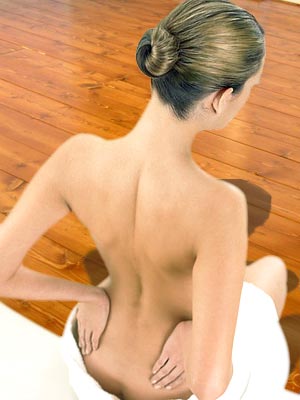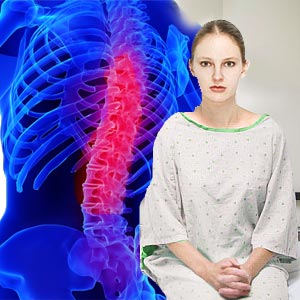Disc Herniation

The spinal disc is a soft 'cushion' between the bones of spinal vertebrae. Herniated disc is common in the lumbar spine, the part of the backbone between bottom of the ribs and hips.
The term 'herniate' means 'to bulge' or 'to stick out'. When disc herniation occurs, the cushion that sits between the spinal vertebrae is pushed outside its normal position. Disc herniation occurs when the spine presses on the nerves around the backbone. This is sometimes incorrectly referred to as ruptured or slipped disc.
Usually patients with back pain, leg pain, weakness of lower back muscles are diagnosed with a herniated disc.
What happens in disc herniation?
Chances are the spinal disc becomes rigid with age. While in young individuals the disc is soft and
elastic, it tends to gradually lose its elasticity and become more vulnerable
to injury. In about 30% of people, even in individuals around the age 30, MRI
shows evidence of disc deterioration.
When the spinal disc becomes less elastic, it can rupture. The spinal nerves and spinal cord can become pinched when the herniated disc bulges out between the vertebrae. Certain activities like sitting, driving, bending or coughing and sneezing can worsen the pain as pressure is applied on the nerves when one makes movements.
Disc herniation causes
- Disc herniation occurs in persons who have spinal
stenosis, which is a problem that caused narrowing of space around the
spinal cord and nerves.
- A herniated disc can occur suddenly or due to a fall
or an accident.
- It can also occur quite gradually due to repetitive
straining of the spine.
Symptoms of disc herniation
- When the spinal cord or spinal nerves gets
compressed, abnormal signals can pass. Some common symptoms include:
- Electric shock pain: Abnormal sensations, which can
be experienced as electric shocks can occur due to nerve pressure.
- Tingling and numbness can be experienced in the
same manner in the regions where electric shocks sensations occur.
- Muscle weakness, nerve irritation, interruptions of
signals from the brain is common symptoms of disc herniation.
- Bowel and bladder problems signal a possible
condition 'cauda equine syndrome' resulting from herniated disc. There
may be problems urinating or having bowel movements or numbness may be felt
around the genitals. This is a medical emergency and the patient has to
rush to the doctor immediately.
- Back pain that spreads to the buttocks and legs,
neck pain that can spread to the shoulder and upper arms occur with disc
herniation.
- Electric shock pain: Abnormal sensations, which can
be experienced as electric shocks can occur due to nerve pressure.
Diagnosis for disc herniation
A medical practitioner examines the patient physically and tests for sensation, muscle strength and reflexes.
MRI is commonly done to diagnose a herniated disc. The MRI may show
abnormalities of the lumbar spine in people as they age. In patients in their
twenties, MRI reveals signs of disc wear. Physical examination findings, MRI
readings and X-ray opinions help the physician come up with a treatment plan
for patients with a herniated disc.
Treatment options for disc herniation
Often the line of treatment depends on numerous factors including symptoms exhibited, age of the patient
and activity level.
- The first option of treatment is rest and
modification of patient activity. It is imperative to avoid activities
that can aggravate the condition.
- Ice and heat applications can help relieve the pain
and relax the muscles of the back. Muscle spasm can also be abated to some
extent by this ice and heat therapy.
- Physical therapy includes a number of lumbar
stabilization exercises that do not directly affect the herniated disc.
Stronger and well balanced muscles can control the lumbar spine and
minimize the risk of injury to the nerves in the disc.
- There are specific anti inflammatory medications that
can help relieve pain associated with disc herniation. Oral steroids can
also help in acute and sudden disc herniation. For severe and short term
pain management, narcotic pain medications are prescribed. However, these
medications can make the patient drowsy and can become addictive.
- Cortisone steroid can be administered directly in the
area where the nerve compression has occurred. The idea here is to relieve
the compression of the nerves.
- Surgical treatment of a herniated disc is recommended
if there are significant neurological findings soon after the injury. With
patients who show cauda equine syndrome, prompt surgical treatment would
be needed.
- Surgery removes the herniated disc and the space
around the compressed nerve is freed. Surgery is done in straight forward
cases through endoscopic or microscopic excision of the herniated disc.
- The new procedure is called endoscopic discectomy;
the surgeon uses a special instrument and a camera to remove the
herniated disc by making very small incisions.
- Surgery removes the herniated disc and the space
around the compressed nerve is freed. Surgery is done in straight forward
cases through endoscopic or microscopic excision of the herniated disc.
Recovery post surgery for a herniated disc
It may take several weeks for the pain to slowly dissipate after surgery for a herniated disc. Pain around
incision is common. This can be controlled through medication. In some cases, a
lumbar corset brace helps to relieve pain.
While gentle and mild activities like walking or sitting upright are encouraged after surgery, patients should avoid lifting heavy objects, bending or twisting the back. Strenuous exercises should also be avoided till such time advised by the doctor.
Right posture tips to reduce disc herniation
- Keep the back straight and only bend the knees and hips while lifting.
- An object can be held closely to the body.
- It would be better to put one foot on a small stool
or box if standing for a long time.
- Avoid wearing high-heeled shoes.
- Never sleep on the stomach.
Top of the Page: Disc Herniation
Tags:#Disc herniation
 Slipped Disc
Slipped Disc Knee Replacement for Women
Rheumatoid Arthritis
Osteoarthritis
Drop Wrist Deformity
Ankylosing Spondylitis
Spinal Decompression
Scoliosis Treatment
Cause of Osteoporosis
Osteopenia
Bone Density Test
Disc Herniation
Tennis Elbow Symptoms
Restless Leg Syndrome Symptoms
Other health topics in TargetWoman Women Health section:
General Women Health

Women Health Tips - Women Health - key to understanding your health ...
Cardiac Care
Women's Heart Attack Symptoms - Identify heart problems...
Skin Diseases
Stress Hives - Red itchy spots ...
Women Disorders
Endocrine Disorder - Play a key role in overall wellbeing ...
Women's Reproductive Health
Testosterone Cream for Women - Hormone replacement option ...
Pregnancy
Pregnancy - Regulate your lifestyle to accommodate the needs of pregnancy ...
Head and Face
Sinus Infection - Nearly 1 of every 7 Americans suffer from ....
Women and Bone Care

Slipped Disc - Prevent injury, reduce pain ...
Menstrual Disorders
Enlarged Uterus - Uterus larger than normal size ...
Female Urinary Problems
Bladder Problems in Women - Treatable and curable ...
Gastrointestinal Disorders
Causes of Stomach Ulcers - Burning feeling in the gut ...
Respiratory Disorders
Lung function Test - How well do you breathe ...
Sleep Management

Insomnia and Weight Gain - Sleep it off ...
Psychological Disorders in Women
Mood swings and women - Not going crazy ...
Supplements for Women
Women's Vitamins - Wellness needs...
Natural Remedies

Natural Diuretic - Flush out toxins ...
Alternative Therapy
Acupuncture Point - Feel the pins and needles ...
Women Health Directory
Top of the Page: Disc Herniation
Popularity Index: 100,689

